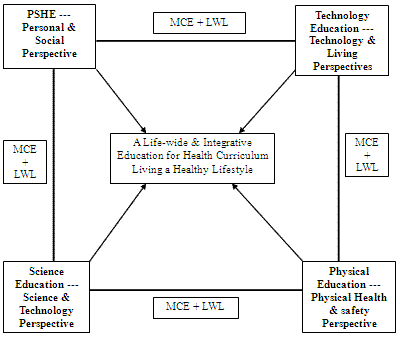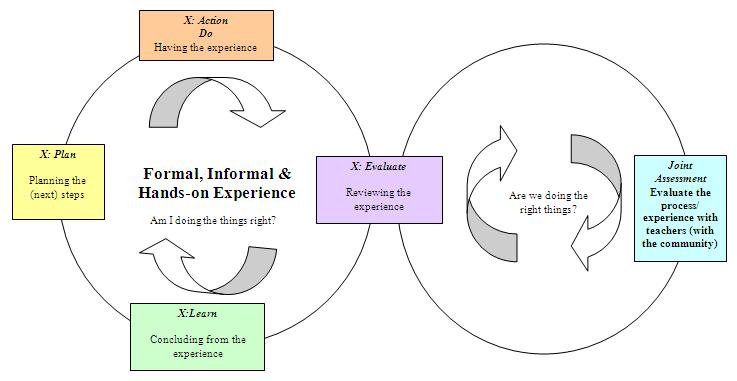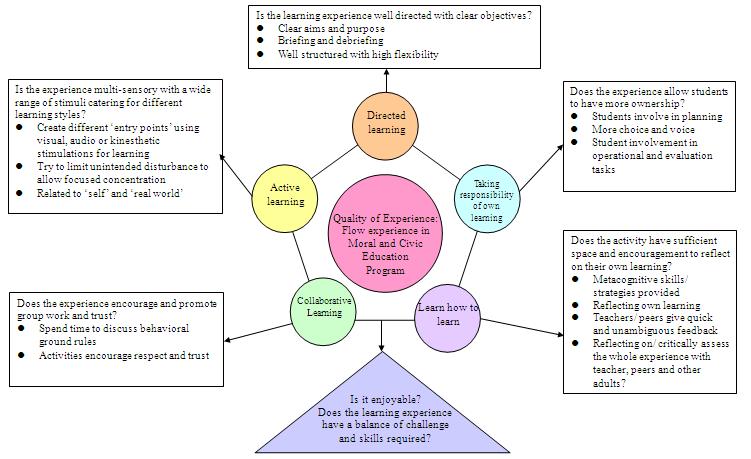| Focus Learning Area: Health Education "Education for Health" and "Whole-person Development" in Lam Tai Fai College |
- Mission and Vision of Lam Tai Fai College in Education for Health
- Conceptual Framework of the Extended Curriculum
- Health Education and Health Promotion in Lam Tai Fai College
- Education for Health' Curriculum Framework 2008-2009:
3-level & 6-stages Developmental Model - Core Strands of the Curriculum Framework
- Curriculum Integration for Whole-person Development
- Health Education Curriculum for Whole-person Development
- What is offered in the Education for Health Curriculum in LTFC?
- Curriculum Integration & Mapping: Biochemistry with Health Education
- Life-wide Integrative Education for Health Curriculum
- Framework for Education for Health in our School Curriculum
- Interim Report of Life – Wide Learning Curriculum – The Sex, Health Environmental Education Modules
- Life-wide Integrative Education for Health Curriculum evaluation
- A Self-improvement Evaluation Model
- Health Education Resource Centre
- Health Education Resource Centre Floor Plan
- Strengths of Lam Tai Fai College in Promoting Health Management and Social Care (HMSC)
- Expected Deliverables of Education for Health for Lam Tai Fai College
![]()
A. Mission and Vision of Lam Tai Fai College
- Established in 2004 with the aims of nurturing a 「Perfect New Generation of the 21st Century」
- for the full actualization and realization of the School's 「Seven Core Values」, i.e. .Perseverance, Excellence, Respect, Foresight, Entrepreneurial Spirit, Creativity, Talent.
- Official statement of 「Mission and Vision」 of Lam Tai Fai College: with a special emphasis in promoting whole-person development through cultivating among students health literacy as well as shaping their healthy life-style.
- Six facets of whole-person development in the school's Extended Curriculum:
- Talent Development (towards a self-affirmative and self-motivated person): Enable students to appreciate their personal strengths and provide them the opportunities to fully develop their potentials, as well as to enhance their creativity and leadership ability, and to unleash their learning potentials through a full development of 「multiple intelligences」.
- Study Skills and Career-related Education (towards a self-directed person with strong sense of self-awareness): Enable students to learn effectively and achieve their personal goals along the course of striving for a career success.
- Sports & Aesthetic Development (towards an ever-growing and self-regulated person): Enable students to widen their horizons and broaden their skill-base through the exposure to sports training and a life of sports, as well as the exposure to aesthetic training and aesthetic appreciation. Through the learning experiences in sports and aesthetic development, students are also given the opportunities to establish a set of positive values towards self-discipline and self-regulation, communication and collaboration, adversity management and life appreciation, personal achievement and accomplishment for social betterment
- Education for Health (towards a responsible and well-managed person): Enable students to cope with daily challenges against a positive state of life by means of acquiring a set of well-established healthy life skills
- Social Awareness and Civic Education (towards a dutiful and contributive person with high standard of personal integrity and compassion for others, strong sense of moral awareness, and with the capacity to fulfill the obligations of a good citizen in community context, national context, and global context): Enable students to understand and to interact positively with the social environment as well as the national, and international environment around them. Instill with students a strong sense of identity on one's roles and responsibilities, as well as opportunities in making greater contribution for social betterment.
- Cognitive Development in LTFC Curriculum Honeycomb (towards a life-long learner with the learning capacity to cope with the changes in this ever-and-fast changing world): Enable students to comprehend and interpret, to analyze and synthesize, to evaluate and to establish one's opinion, in order to enhance their self-learning capacity and problem-solving abilities. Acquisition and construction of knowledge through:
- Enhancing Biliteracy and Trilingualism
- Enriching knowledge base through a 4-focus Learning Curriculum
- Enabling a full play in Multiple Intelligences and Life-wide Learning
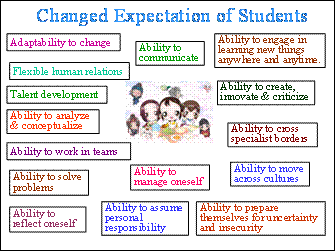
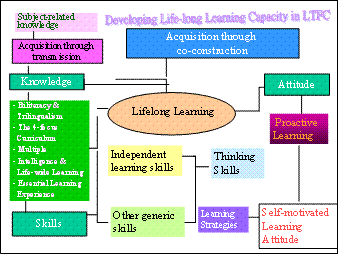
![]()
B. Conceptual Framework of the Extended Curriculum
(A common platform for formal, informal, non-formal and hidden curriculum)
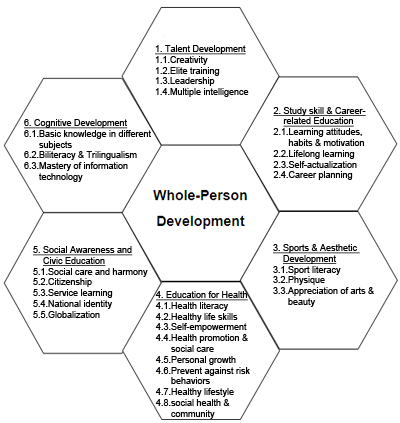
![]()
C. Health Education & Health Promotion Framework in LTFC
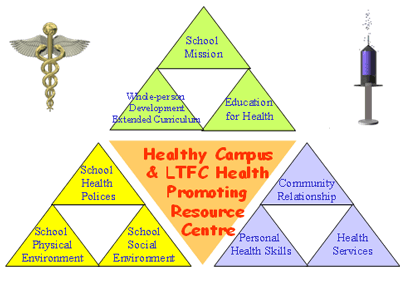
- School Mission Statement: Lam Tai Fai College is a Direct Subsidy Scheme secondary school. It was established by Lam Tai Fai Charitable Foundation in 2002. The school was open to students in 2004, in which an innovative school-based curriculum includes Creative Fashion Design, Sports Science and Recreational Management, Health Education and Innovative Technology, were offered.
- Whole-person Development Extended Curriculum: Education for Health (Health Education) forms one of the six LTFC extended curriculum honeycomb (domains). In an integrative, life-wide and holistic extended curriculum setting which aims at synergizing the objectives, influence and impact of formal, informal and non-formal as well as hidden curriculum we delivered.
- Education for Health: It covers curriculum and activities with Health Education as the core component which include personal health skills:
- Needs Assessment
- Major items of Health Education Curriculum and Activities
- The Integrated Course of Education for Health and Physical Education as well as other related domains as well Integrated Humanities, Integrated Science, Technology, Moral & Civic Education, Life-wide Learning, Co-curricular Activities
- School-based Health Education Course in Junior Secondary
- Health Management & Social Care in Senior Secondary
- Utilizing multiple strategies to implement health education curriculum
- Education for Health (Health Education) curriculum: Design of the programme and activities
- School Health Policies:
- Needs Assessment
- Development & Implementation of School Health Policies
- Self-health Assessment for ALL (LTFC Health Education Resources Centre)
- Assisting our health promoting counterparts to plan the health promoting policies and implement the health promotion tasks
- Providing support to schools, improving the Web-based learning & support as well as organizing information dissemination. LTFC Health Education Resources Centre assuming a pulling force to coordinate the efforts of the member schools in promoting a healthy school culture among schools in Hong Kong.
- Conducting school self-evaluation on school health policies
- School Physical Environment:
- Needs Assessment
- Providing a safe environment for the school community
- Providing proper sanitary facilities and water
- Implementing environmental protection and energy conservation programmes
- Encouraging students to take care of the school facilities
- Providing for the students a suitable learning environment
- Establishing a healthy eating environment
- Designing programmes for the Physical Environment of the school
- School Social Environment:
- Needs Assessment
- Creating good human relationships on campus
- Creating an environment of care, trust and friendliness in school
- Providing appropriate support and assistance to students who are at a particular disadvantage
- Creating an environment in which all students are valued and differences are respected
- Designing the programmes for the School's Social Environment
- Community Relationships:
- Needs Assessment
- Communication and collaboration between the school and the students' families
- Communication and collaboration between the school and the community
- The availability of community resources.
- Personal Health Skills:
- Needs Assessment
- Improvement of students' physical fitness (Gymnasium, Fitness Centre, Health Education Resources Centre)
- Health promotion talks
- Training of Health Ambassadors
- Functions and administration of the school Fitness Centre, Health Education Resources Centre
- Designing programmes for personal health enhancement
- Health Services:
- Needs Assessment
- Health examination
- Health care of students with specific diseases
- Emergency care on campus
- Communicable disease control in schools
- Designing programmes for health services
![]()
D. Curriculum Integration for Whole-person Development:
Integrating Health Education into School Curriculum: An Extended & Integrative Approach
1. 3-level & 6-stage Model
In conceptualizing and formulating the LTFC Extended Curriculum, a 3 levels and 6 stages developmental model was designed, which echoes fully with the advent of New Senior Secondary (NSS) Academic Structure.
The 3 levels and 6 stages developmental model:
|
Level |
Developmental Stage |
Focus |
Developmental Performance Indicator |
|
JS1 |
Adaptation |
Knowing oneself |
ÜIdentify talent areas ÜAdapt to new identity and expectation ÜEstablish a good healthy lifestyle ÜForm self-management and build good learning habit ÜTo be a responsible person ÜDevelop language ability ÜRespect and appreciate ÜDevelop harmonious relationship ÜLearn together and work together/ develop collaboration and cooperation ÜHave a good physique |
|
Js2 |
ÜFully display talents/ fully develop distinctive potential ÜDevelop talent-oriented ÜAssume different identity, including sex, national and social ÜMaster learning skill development and information processing skill ÜDevelop skills-based learning ÜAchieve a balance between culture and sports life ÜUnderstand the interpersonal skills ÜEstablish a beautiful mind |
||
|
JS3 |
Transition & Enhancement |
Knowing our society & nation |
ÜMaster comprehensive study skills ÜBe confident in social/ mature interpersonal skill and leadership skill ÜStrive for good performance in talent areas ÜFoster problem-solving and enquiry-based learning ÜApply information technology in learning ÜAcquire wider scope of knowledge in cultural and science subjects ÜLearn more about the world ÜAble to provide service with quality ÜLead a healthy life as measured by health indicators ÜBe competent in physical fitness and literacy (i.e. Territory-wide System Assessment) ÜRecognize opportunities and choices to plan its own career pathway |
|
SS1 |
Ü Able to assume the leadership role to contribute the well-being of others Ü Possess wide experience of social and academic exposure Ü Enable to learn in a independent and critical manner Ü Prepare career-related skill and provide information for future plan Ü Actualize one's talent reach for high standard |
||
|
SS2 |
Self-direction & Empowerment |
Knowing Our World |
Ü Prepare for further enhancement and advancement in study skill Ü Formulate plan to achieve career goal Ü Promote self-directed learning/ self-regulated learning Ü Prepare for adulthood Ü Develop problem-solving skill in real life events Ü Be a mature leader and always ready to support others Ü Develop Resilient skills Ü Build healthy mental stage to face challenge Ü Build career-related experiences and skills / equip students with necessary career skills for career development Ü Work for Career-related exposure, career mind, career plan |
|
SS3 |
Ü Strive for accomplishment and actualization of goals and 「 life-long learning」 capacity Ü Enable oneself to set career goal to achieve own aspiration Ü Master of knowledge in cultural and science studies Ü Understand and appreciate equality and the value of international social justice Ü To be an empathetic and dutiful person in contributing to society Ü To be a motivated leader |
![]()
E. Core Strands of the Curriculum Framework
Major Strands:
The 3-level and 6-stage model is composed of the following core strands. They are:
Education for Health
Education for Health is essential to enable students to acquire the knowledge and skills to promote personal, family and community health. The second & the third levels study the relationship between positive health behaviors/lifestyle choices and the prevention of injury, illness, disease and premature death. They also learn about stress management strategies, first aid and CPR, conflict resolution and dealing with grief and loss. Each student will learn to develop his/her personal health plan. [Refer to Notes 1 for the 'Education for Health' Curriculum Framework 2008-2009]
Physical Education
The first and the second levels begin to learn the rules of all the team and dual sports. Activities may include developmental tumbling, swimming lessons and dances. Other areas of concentration include soccer, flag and touch football, tennis, volleyball, badminton, basketball, track and field, posture-diet-functional exercise, physical fitness work, simple games and relays.
The third level advances their skills and learns new sports like team handball, softball and archery. Emphasis is placed on strategy, form, teamwork, rules, sports vocabulary and the individual's responsibility for his/her own progress.
Life Skills
Each level offers a daily Life Skills class consisting of programs in the following areas: nutrition, physical education and fitness, peer, family and community relationships, collaborative and cooperative skills, and religious studies, spiritual values and ethics.
Skills for Adolescence
This strand is taught to students in all levels each year. It is designed to involve students in actively dealing with such issues as emotions, peer and family relationships, substance awareness, decision making and goal setting. Classes provide practical experiences in improving communication skills, resisting negative peer pressure, setting reasonable goals and making thoughtful decisions. The ultimate goal for this class is to help students increase their self-confidence and motivation.
Project Adventure
Lam Tai Fai College, offers students tremendous opportunities for community and personal growth. It is an integral part of the Life Skills block. With a commitment to "challenge by choice," each student has the opportunity to stretch according to his/her needs and definition, take a risk, and try something very difficult while enjoying the wonderfully sensitive support of a group of knowing peers.
Service Learning
Spiritual growth is not simply a matter of personal beliefs; it requires outreach to other people in a spirit of relationship building. Students become more aware of others' needs and differences through community service projects integrated into the curriculum at all levels.
![]()
F. 'Education for Health' Curriculum Framework 2008-2009
Objectives:
- Enabling students to acquire an appropriate health knowledge
- Enabling students to have an understanding of the implications of health actions
- Empowering students to have a positive attitude to the relevant health-related behaviours
- Enabling students to develop self-learning skills and personal health skills in order to establish a healthy lifestyle
- Empowering students to achieve health literacy and media literacy
- Enhancing students' ability to promote health concept to their family members and the community
|
Level |
Stage of Development |
Criteria of Development |
Content |
Formal Learning |
Informal Learning |
Learning Outcome |
|
|
JS 1 |
Adaptation |
|
|
|
|
Students should be able to:
|
|
|
JS2 |
|
|
|
|
Students should be able to:
|
||
|
JS3 |
Transition & |
|
|
|
|
Students should be able to:
|
|
|
SS1 |
|
|
|
|
Students should be able to:
|
||
SS2 |
Self-direction & Empowerment |
|
|
|
|
Students should be able to:
|
|
|
|
|
|
|
|
Students should be able to:
|
||
![]()
G. 健康教育科 課程大綱
|
主題 |
學習目標 |
Correspondent |
|
|
中 32節 |
1.1健康認知 |
|
N.A. |
|
1.2 個人成長與發展 |
|
F1 (Unit 2): |
|
|
1.3 自我實現 |
|
F1 (Unit 2): |
|
|
1.4 心理和情緒健康 |
|
N.A. |
|
|
1.5家庭關係-家庭衝突 |
|
N.A. |
|
|
1.6性教育-男女之別、真愛要等待 |
|
N.A. |
|
主題 |
學習目標 |
Correspondent |
|
|
中 32節 |
2.1食物與營養 |
|
N.A. |
|
2.2心理和情緒健康 |
|
N.A. |
|
|
2.3吸菸、酗酒、藥物濫用的預防 |
|
N.A. |
|
|
2.4 環境教育 - 人類活動對環境的影響 (初階)、污染對人類健康的影響 (初階) |
|
N.A. |
|
主題 |
學習目標 |
Correspondent |
|
|
中 32節 |
3.1 傳媒素養—傳媒的定義及影響、傳媒與健康之關係 |
|
N.A. |
|
3.2 消費者健康—認識我們的消費行為、做個精明的消費、健康產品和服務、金錢的主人 |
|
N.A. |
|
|
3.3 自我實現 |
|
||
|
3.4食物與營養 |
|
N.A. |
|
主題 |
學習目標 |
Correspondent |
|
|
中 32節 |
4.1 生命、老化與死亡 - 生命的各個階段、長者的健康與關懷、認識死亡與喪親 |
|
N.A. |
|
4.2 家庭關係 - 家庭衝突、家庭轉變、家庭計劃 |
|
N.A. |
|
|
4.3性教育 – 性之歷史、性與生殖、有關性所衍生的社會問題 |
|
N.A. |
|
主題 |
學習目標 |
Correspondent |
|
|
中 16節 |
5.1 環境教育 - 人類活動對環境的影響 (進階)、污染對人類健康的影響 (進階)、環境保育、香港的環保團體 |
|
N.A. |
|
5.2 生命、老化與死亡 - 生命的反思(自殺問題)、生命的意義 |
|
N.A. |
|
|
5.3疾病預防與管理 -認識傳染病、慢性病、愛滋病與性病及其預防 |
|
N.A. |
|
主題 |
學習目標 |
Correspondent |
|
|
中 32節 |
6.1香港的醫療及社會服務 - 香港的醫療及社會服務的架構、特色和分類、在未來所面對的挑戰、醫療及社會服務中的專業人員及建立對社會關懷的責任感 |
|
N.A. |
|
6.2照顧不同人士的技巧 - 有效的溝通技巧、建立領導能力及團隊精神、成為有效助人者的特質 |
|
N.A. |
|
|
6.3安全與急救 - 急救的定義、認識急救箱、基本急救行動 |
|
N.A. |
![]()
H. Health Education and Health Promotion in Lam Tai Fai College:
1. What is the Education for Health Curriculum offered in LTFC?
Why Integrating
- Avoid marginalization
- Avoid trivialization
- Mirroring learners' daily life
- A sense of community
- Allowing holistic improvement or monitoring
- Integration
- Assimilation --- absorbed
- Tribalism
- Mosaic at piece --- Roman art
Giving a full play to our school's mission and vision, LTFC curriculum integration works for connectedness, networking, complexity and sustainability --- to prepare the ground for the nurturing of the talent of the 21st Century. Integration and differentiation equal to complexity (Csikzentmihalyi)
What is our Education for Health Curriculum?
Latin 'currere' --- race track
|
Curriculum |
Perspective |
Key Questions |
|
As Experience (Dewey) |
Process-based |
How do our students go through |
|
As Subject --- programme of study, |
Content-based |
What do our students learn? |
|
As Plan, intention (MacDonald) --- |
Management- |
In what way does their learning progress |
|
As Objectives (Tyler) |
Outcome |
What do we want our students learn? |
a) What are the learning goals?
(e.g. Healthy Lifestyle & Responsibility ---each with specific learning targets.)
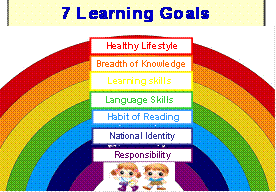
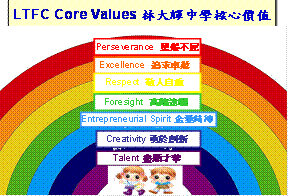
In addition to a Formal Health Education Curriculum in the regular time-table, an extended curriculum was designed as a platform to contain Knowledge & Concepts, Skills & Action s as well as Values & Beliefs in the implementation of the said curriculum. It sheds light on meeting the needs of the curriculum contents such as living a healthy lifestyle and meeting responsible decisions on Health Issues.
An Example:
| Personal | (Family) | Community | Environmental | |||
| Health | (Neighbourhood) | Health | Health |
|
|
Entry Point C
|
|
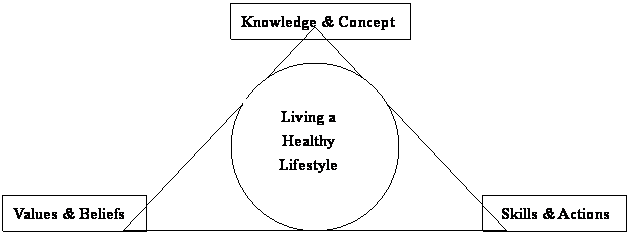 |
||
|
Entry Point B
|
|
Entry Point A
|
b) What should be learned?
 |
Formal Curriculum ------- Primary --- GS + PE | |
|
Junior Secondary: Health Education & other related curriculum |
||
| Senior Secondary --- Heath Management & Social Care (HMSC) (HKDSE, NSSC) |
|
KNOWLEDGE & CONCEPT |
||
| Moral & Civic Education (MCE) |
|
|
|
VALUES & BELIEFS |
||
| Life-wide Learning (LWL) | ||
| SKILLS & ACTIONS |
![]()
I. Biotechnology Curriculum (S.1-S.3) to be incorporated in the curriculum of Integrated Science S1 to S2, Physics, Chemistry & Biology in S3
A. Living things & their life
- Characteristics of life
- Classification of organisms
- Chemicals of life
- Cell and organelles
- Cell division
- Gene and heredity
- DNA, RNA and proteins
B. Health
- Food and nutrition
- Diseases and public health
- Microbiology
- Basic pharmacology
- Basic toxicology
- Chinese herbal medicine
- Gene therapy
C. Environment
- Sewage treatment
- Composting
- Bioremediation
Biotechnology Techniques
- Living Things & their Life and Environment: - Western Blotting
- Living Things & their Life and Health: - Fluorescent Microscopy
- Health & Environment: - Cell Culture
Biotechnology in Society & Bioethics
- Recent advances in Biotechnology
- Regulation on genetic manipulation
- Cloning
![]()
J. Education for Health Curriculum Frameowrk
Life-wide Integrative Education for Health Curriculum
Curriculum Structure for Life-wide Integrative Education for Health
|
Junior Secondary |
Senior Secondary |
|
PSHE Personal & Social Development (EPA, Social Studies, Integrated Humanities) |
PSHE Personal & Social Development (EPA, Social Studies, Liberal Studies) |
|
Science Education Life & Living (Science) |
Science Education Life & Living (Biology, Physics, Chemistry & ICT) |
|
Technology Education Technology & Living (Home Economics) |
Technology Education Technology & Living (Home Economics) |
|
Physical Education Health & Fitness Knowledge & Practice of safety |
Physical Education Health & Fitness Knowledge & Practice of safety |
Knowledge & Concepts: Health Education
(1) PSHE: Learning Objectives (KS3)
Subjects: Social Studies
- To understand the importance of maintaining a healthy lifestyle and be informed about matters related to health.
- To understand the importance of valuing oneself & others
- Strands: Personal & Social Development: Healthy Lifestyles (KS3), Social Systems & Citizenship (KS3)
(2) Science Education: Learning Objectives
- Be aware of the physiological and emotional changes during puberty
- To recognize the importance of maintaining body health
- S1-S3 Science Curriculum ---
Unit 3 Cells & Human Reproduction;
Unit 5 The Wonderful Solvent-Water
Unit 7 Living things and air
Unit 11 Sensing the Environment
Unit 12 A Healthy Body
(3) Technology Education
| Technology Education | Health | |
| The purposeful application of knowledge, Skills and experiences in using resources to create products or systems to meet human needs | 「A state of complete physical, mental, and social well-being and not merely the absence of disease or infirmity (WHO) |
|
  |
||
|
(4) Technology Education / Home Economics
Healthy Living
- Personal
- Personal Hygiene
- Healthy Eating
- Family
- Healthy Home & Family
- Community
- Healthy Environment
- Health Community
![]()
K. The Framework for Education for Health in our School Curriculum
|
Living a Healthy Lifestyle and |
|
|
Personal Family Community Environmental |
|
|
|
|
|
Thematic
Activity |
KNOWLEDGE & CONCEPTS
|
|
(Life events in Moral & Civic Education Programme and --- Note 4 with further elaborations on Knowledge & Concept, |
|
A Cross-curricular approach is adopted and the key issues identified by the Education for Health curriculum would form the backbone of study for the topics or issues.
In the course of learning, the issues or topics will be studied from different perspective. It aims at achieving the 3-Es of curriculum development, that is, enabling, enriching and extending.
Major Health Education Concepts in the LTFC Education for Health Curriculum
|
Personal Health |
|
Environmental Health & Issues of |
|
|
Personal Hygiene Healthy Body Healthy Living Common Diseases Health & Fitness Safety Education |
Self-esteem Managing Emotions Self Discipline Human Relationships Sex Education Substance Abuse Life & Death |
Community Health |
Environmental Awareness Environmental Protection Environment and Health Issues Poverty & Health International Cooperation Sustainable Development |
|
Environmental Hygiene Civic Responsibility Health Services Public Health issues Technology & Living Diseases and Control Occupational Safety Equal Opportunities Consumers of Health |
|||
+ Life Event Approach (LEA)
+ Life-wide Learning (LWL)
For a flexible, holistic & comprehensive implementation of the curriculum, a Life-wide & Lfe-event approach is to be adopted whenever, wherever applicable, especially when it is found possible and feasible. A systematic and life-wide approach to the health education curriculum by using school-based nutrition education curriculum as an example.
A systematic and life-wide approach to the health education curriculum by using school-based nutrition education curriculum as an example
To develop school-based nutrition education curriculum, in line with the goals of the current curriculum reform. The seven goals of the curriculum reform are enabling our students: (1) to live a healthy lifestyle; (2) to possess knowledge in the Eight Key Learning Areas; (3) to master independent learning skills; (4) to use languages in communications; (5) to develop a habit of reading; (6) to understand their national identity and commitment and (7) to recognize their roles and responsibilities. Relevant contents under the seven goals into a school-based curriculum are integrated. Reviews and evaluations have been done continuously during the process, together with plenty of communications, trainings and experience sharing with the students, parents and teachers..
Promoting in the Eight Key Learning Areas and the Four Key Tasks (moral and civic education, reading to learn, project learning, and information technology for interactive learning) makes school-based health education or nutrition education curriculum a more effective one. Teachers can flexibly use life events as the teaching strategy to introduce health education, or to promote interactive learning by stimulating students' higher-ordered thinking in related to health issues. Teachers should also consider the real health needs and the interests of the students at specific developmental stages.
An example of school-based nutrition education curriculum
A cross-subject and cross-key task nutrition education programme during English-speaking assemblies:
- Healthy breakfast through reading 'My Pyramid' .
- Fruit and vegetable poem reading competition.
- A life-wide curriculum on healthy breakfast to provide practical learning experiences for the students through integrating English, Liberal Studies, Science, Physical Education, English Language and the Four Key Tasks.
- A programme to promote eating fruits and vegetables and healthy living
- The moral and civic education therefore becomes an important role in teaching students to treasure food resources, to learn about environmental protection, and to build up proper attitudes towards food. If such teaching can be integrated as cross-subject or cross-key-task teaching units, such as Integrated Humanities, Integrated Science, English, project learning or IT education, then students' learning would become more comprehensive and systematic.
![]()
L. INTERIM REPORT OF LIFE-WIDE LEARNING CURRICULUM --- THE SEX,HEALTH & ENVIRONMENTAL EDUCATION MODULES
[Part A] Formal Life-wide Learning Education Curriculum
REVIEW on Sex, Health & Environmental Education modules that were integrated into the existing curriculum (Cross-curriculum approach) [Ref : SCHOOL'S MAJOR CONCERNS 4 (a) - Devising and implementing measures through both formal and informal curricula to help promote 「 holistic education 」 in the school.]
Progress
Five sex education modules:
- curiosity;
- the two sexes;
- making friends;
- love-friendship-dating
- sex and love
55 minutes each, were implemented in all junior secondary classes in the Life Education lessons. With well planned activities and follow-up discussion, the programmes were well received by our junior students. For other form levels, the programmes would be selected on the needs of students and implemented throughout the year.
[Part B] Cross-curricular Activities
REVIEW on Sex, Health & Environmental Education modules that were learnt by our students within school hours through cross-curricular and life-wide learning experience approach (by making use of lessons from different subject areas).
- 10 health professionals from the Department of Health organised a 55-minute programme on self image (我最有型) for secondary four & five classes. More sessions would be organised for our Secondary 6 (relating to the lover) and Secondary 3 (issues of love and contraception) students.
- A large scale growth survey program, not envisaged in September, was fully implemented for all students in 10 chosen classes (according to statistical criteria). Growth parameters (weight, height, waist size, blood pressure, body fat) of our students were monitored. . Subject teachers from the physical education section and other academic disciplines were involved. It was diagnosed that 34 students out of
about 420 have high blood pressure. Students' parents were also informed on an
individual basis. - A mass programme that involved 10 classes of Secondary 1 and Secondary 2 students was held. The topic is the prevention of cigarette smoking. It is a joint function between the discipline committee and sex/health education committee. Multi-media techniques, in particular when they were coupled with a 「 what-if 」 style of life choice questioning, attracted our students well.
[Part C] Life-wide Learning Experience
REVIEW on Sex, Health & Environmental Education activities that were held for our students beyond school hours both within and outside our campus
[Ref : SCHOOL'S MAJOR CONCERNS 4 (a) - Devising and implementing measures through both formal and informal curricula to help promote 「 holistic education 」 in the school.
4(b) - Devising and implementing measures to help students accomplish the school yearly theme, 「 It is more blessed to give than to receive 」.
- A group of 21 students (from S3 to S7) was recruited to form our team of health ambassadors. About 10 of our health ambassadors co-operated with the Red Cross team members to stage a whole-day publicity campaign concerned with health care of AIDS patients (the red-ribbon campaign).
- Some of our students participated in an evening seminar on avian flu, organised by the Faculty of Science, the University of Hong Kong.
- The scheduled visit to the drugs education centre was postponed to the second term (because of the fact that 3 of our teachers in the discipline, sex/health committees participated in a training session).
- The broadcasting of health topics via campus TV and board display were done. However, students were reluctant in making regular change of the display board. Health reminders and posters were put on the notice board of classrooms in response to the potential hazards of avian flu. A few health messages were delivered to the whole school during morning assembly by our teachers and health ambassadors. The framework of our health ambassadors web page has been set up but with little contents. This is an area of deficiency that we have to address in the Second Term. On the other hand, the PGHLSU (Personal Growth & Healthy Lifestyle Unit) web page has maintained its hyper-linked function on issues of current interest. Regular posting was put on the school's web page 「index page」 to disseminate timely information. A presentation slide explaining the details of avian flu was uploaded to the Biology subject web page (in addition to the school webpage on Environmental Education. The project is running well during the writing up of this interim report. A number of books and education materials were either purchased or received and filed in the school library or attached to the Biology department. Regarding the proposed agenda of preparing health foods in school, it was subsequently changed to "growing cabbage and tomato by water culture 水耕法" on the pavilion garden on the 2/F and the roof of school.A Green House is being planned at the far end of the playground in the Second Term.
To summarize, looking at the changes in the school environment, participation rate of our students, and judging from their verbal and non-verbal feedback while the activities were held, teachers and health ambassadors have made 「 health awareness 」 and " a wish to know more", part of their daily life. The chairperson of the PGHLU would like to take the opportunity to say thank you to our teachers and all health ambassadors for their dedicated support for the smooth running of the events.
![]()
M. Life-wide Integrative Education for Health Curriculum evaluation
Curriculum evaluation forms a focal part of the implementation of the curriculum. To be authentic, evaluation is to be done on a cross-curricular and thematic basis. Life-wide learning activities and life events are to be used as convenient evaluation points.
While for a fuller realization of the curriculum objectives, sex, health and environmental modules are included in the formal, informal & hidden curriculum. An INTERIM REPORT OF LIFE-WIDE LEARNING CURRICULUM --- PERSONAL GROWTH. SEX, HEALTH & ENVIRONMENTAL EDUCATION MODULES was included for reference (Note 6)
c) How to learn and teach effectively
In order to make effective curriculum plan for the Education for Health (in fact, one of the domains in the School Extended Curriculum, a checklist to identify curriculum gaps has been used in LTFC.
[A sample of the extract--- adopted from CUHK's Health Promoting School Scheme]
|
1 |
Personal Health |
|
|
2 |
Food & Nutrition |
|
|
3 |
Mental & Emotional Health |
|
|
4 |
Family Life & Sex Education |
|
|
5 |
Prevention & Treatment of Diseases |
|
|
6 |
Smoking Alcohol & Drug Abuse |
|
|
7 |
Consumers' Health |
|
|
8 |
Safety & First Aid |
|
|
9 |
Environmental Health |
|
|
10 |
Life Education (life, death, old, …) |
|
In enhancing the learning and teaching effectiveness of Health Education Focus Learning Area (FLA) and promoting a culture of Education for Health in LTFC, the HE Department and the PGHLU work hand in hand on some of the key tasks listed below. They are:
| R | Promote a whole-school curriculum integration by using Education for Health as the base |
| R | Review existing curriculum, identifying gaps; |
| R | Use multiple 'entry' points (for example: engaging students in cleaning, energy conservation, healthy eating and black spots reporting campaigns); |
| R | Employ age-specific approaches (for the lower forms --- more on beliefs, skills and actions); |
| R | Help students making responsible/informed decision; |
| R | Encourage students to form healthy habits; |
| R | Go beyond 'knowledge' and target for 'action'; |
| R | Establish role models (from teachers, parents, ...) |
| R | Capitalize current / crit ical events |
d) How to assess or appraise?
Education for Health as an essential component to foster students' whole-person development, it meant that it is related to students' personal growth, habit formation and development for adolescents as well as adulthood, if it is such, it is for sure that it cannot be assessed by merely using pen and paper. As one of the domains in our school's extended curriculum, we put much emphasis on the mode of assessment, especially the kind of internalized & formative assessment leading to the expected outcome. As practiced in our school, the nature and format vary. They may include:
- No 'pure knowledge' testing
- Assessment for learning (e.g. feedback, reflection, …)
- Using relevant contexts in assessment
- Qualitative approach
- Portfolios --- with outstanding performance or achievement in health-related learning activities.
In other words, LTFC has adopted a whole school approach for promoting Health Culture or rather Education for Health. We endeavour to:
- Promote a healthy school culture in an organizational level, e.g. curriculum integration & a holistic extended curriculum framework;
- Develop sustainable cultures of a compassionate & intimate campus, healthy school, environmental friendly school, a campus of life, green school;
- Foster very close partnerships with the Centre of Health Education & Promotion (CHEP), the Health Department, the tertiary institutions and NGOs;
- Curriculum, Ethos and Activities, a 3 in 1 approach;
- Self-evaluative mindsets, especially promoting healthy culture and individual health services through the Health Education Resources Centre (HER Centre);
- Cultivate a strong health promoting school concept conducive to students' whole-person development in personal qualities, positive values & attitude, individual study and career plans, genuine heart to serve and love, good citizenship, strong self and national identity.
Evaluation parameters & methods
In the course, a learning process is applied. We follow a 'ROAPR' process which is to Reflect Critically, Observe, Act, Plan and Reflect Initially. At the same time, teachers evaluate and learn following the same 'RPAOR' cycle. They focus on process and content and share their view critically. Shared understanding is attained through reflection and dialogue. Then they work collaboratively to improve the outcome.
R. Tyler (1949) viewed evaluation as the criteria for the achievement of the goals (Note 7a). To achieve the education goals in our Life-wide Integrative Education for Health curriculum, a double learning cycle for organization learning which is a quality learning cycle for evaluation and assessment is designed (Note 7b). It works for the establishment of a self-improvement evaluation model.
The Cycle runs as follows: Plan (planning the steps) -> Do (having the experience) & Learn (concluding from the experience) -> Evaluate (reviewing the experience) -> Joint Assessment (evaluate the process/experience with teachers/the community). As the implementation and outcome of this curriculum involves learning experience, life-wide learning opportunities, development of skills, cultivation of attitudes and values, so a process-oriented, formative and continuous assessment for learning should be conducted. Evidence is generated from diversified sources. It is realized that one learning outcome will facilitate another outcome, similarly one product leads to another. If viewed as such, multiple assessment modes seem necessary. What we have in mind is assessment for learning, not assessment of learning. Process and outcome form core parts of the evaluation. It covers a wide range of aspects from moral, academic, physical, aesthetic and social which means intellectual, affective and social domains.
In assessing the quality or effectiveness of the experience which may be in the forms of formal, informal and life-wide learning, experience performance indicators can be devised as a tool of assessment. Questions may develop from the 5 essences of life-wide learning experience, namely directed learning, active learning, collaborative learning, learning to learn and taking responsibility of own learning. An authentic response and feedback can be gathered which allows consistent renewal and modification of the process and the cycle. (Note 7 a & b) It is indeed a self-evaluative quality framework by linking all learning experiences. It goes back to our school's composite performance indicators pertained in the 3-level and 6 stages. Students experience are recalled, built on and extended by setting indicators on the essences of quality learning experiences in the questionnaire survey, portfolio, discussion, presentation, etc.
Form of Assessment
Forms of assessment vary a lot as to the kind of activities. Four kinds of assessment will be employed.
- Authentic assessment
- Performance assessment
- Alternative assessment
- Portfolio assessment
Method: both qualitative and quantitative
Qualitative:
- Students' portfolio on Mission Accomplished Passport (MAP I) and My Attainment Profile (MAP II)--- our school's Personal Growth Programme and the Whole-person Development Award Scheme Record Book
- Celebrating successes
- Feedback from the navigator schools, community and the seed schools
- Evaluation Reports
- Student Performance Report
- Student Self-assessment & Self-reflection in sharing and presentation sessions
Quantitative:
- Number of participants in learning activities
- Utilization of the Health Education Resources Centre
- Number of activities organized for the Navigator & Seed Schools
- Involvement in the Learning Carnival
- Response from the dissemination activities
e) Summary & the Way Forward
- Audit the existing learning opportunities related to Education for Health.
- Make good use of MCE, Health-related, social life exemplars, current events and issues.
- Get the best from expert organizations and optimize the use of LWL opportunities.
- Set up a help desk, experimental station and a resource hub for curriculum development for Education for Health for the Junior Secondary and Health Management & Social Care for Senior Secondary.
- Extend courses, experience sharing sessions, hand-on practice for teachers and heads to acquire concepts and practical knowledge about Education for Health.
- Provide suitable information and resources for schools, e.g. the navigator schools and seed schools as well as other schools in HK.
- Incorporate Education for Health & Health Promoting concepts in school development plan. School self-evaluation system.
- Recognize student participation in health related activities and community services.
![]()
N. Note 7 (a) : Double Cycle for Organization Learning
(A Self-improvement Evaluation Model)
Note 7b: Curriculum Assessment Framework
![]()
O. Health Education Resources Centre:
Health Education Resource Centre (HER Centre) at Lam Tai Fai College:
With (i) Training and Interactive Learning Centre, (ii) Health Care & Self-assessment Centre, (iii) Resource Corner.
Objectives:
- To arouse students' health awareness;
- To develop students' self-reflective health habit;
- To consolidate students' understanding of health indicators (one of the areas of studies that students should build up in HMSC curriculum) ;
- To enhance their skills & ability in practicing health assessment exercises;
- To facilitate the implementation of health portfolio/profile;
- To foster a health promoting culture in school;
- To serve as the base for dissemination, sharing and partnership programme;
- To link with academics and students of Health Education or HMSC in the territory, in the Mainland or overseas through visits or video-conferencing;
- To serve as studio for the production of HMSC teaching materials or health-related programmes;
- To serve as a resource centre to collect and distribute health-related materials, information as well as a centre of support to all interested schools;
- To promote self-evaluative culture among teachers, students as well as parents; and
- To cultivate among students self-assessment culture.
The assessment tools, equipment and illustrative models can be divided into the following categories:
A) Assessment for Physical Health & Assessment Tools for Psychosocial Health
Purposes:
- A health care centre for practicum in HMSC (experiential learning)
- Skill-based training in monitoring family health (skill-based learning)
- Skill-based training in self-assessment on health condition (skill-based learning)
- A centre to develop students' health profile all along the 6-year development throughout their secondary school life (reflective learning)
- A health profile should form part of the student development profile and inspire them of the need of formulating and working on a plan for personal growth (behavioral learning)
- The health profile should be a e-based assessment system that stores data for self-evaluation and self-reflection
- The health profile should be a e-based data bank that can facilitate medical research and education research (cognitive learning)
- A centre to promote community and family health, that, this centre will be open to parents for parent education & parental activities
- A centre to promote health awareness in the school, that, teachers and staff will receive training in the centre, and, it will be open for health assessment on self-access basis
B) Self-directed learning corner -> Health Education Resource Centre
Purposes:
- The HER Centre as a resource centre to provide most up-dated information about major topics of and current issues in HMSC with a special emphasis of linking knowledge (cognitive learning) with real life situation to inform students of what health-related choices that they may have (reflective leraning), as well as linking the learning of HMSC with Liberal Studies and other related disciplines (cognitive learning – consolidation and synthesis).
- The HER Centre as a training centre for Health Ambassadors or students preparing for health-related services/promotion activities(experiential learning), where information and data are provided for planning and problem-solving activities (skill-based learning). – Training facilities like wyte-board and smart-board will be installed.
- The HER Centre as a self-access lerning centre to develop students'self-learning behavor and instill with students the habits to access regular updates of health information (behavorial learning). A wide range of magazines will be ordered and provided.
- The HER Centre as an interactive learning centre where seminars about health promotion and health education will be held. -- Meeting facilities like LCD projector and visualizer, sound system, computer access internet and campus TV, capture point for campus TV transmission are therefore installed. To facilitate greater sharing and wider dissemination, video conferencing will also be provided.
- The HER Centre as a resource centre to properly store and display school/teacher collections for knowledge management, lesson preparation as well as curriculum development.
- The HER Centre as a teaching centre to offer a resource-rich environment for the teaching of HMSC. More advanced teaching facilities will be put in place for training, meeting, sharing, exchanging or even doing research or studies.
- The HER Centre as a virtual library that collects and organizes web-based information, and produce web-based resources to facilities learning, teaching and professional activities as mentioned in point 1-6 above.
- The HER Centre can be used for inter-school sharing, training and workshops. At the same time, with the provision of modules for promoting family health, it can be used by for organizing parent workshop and parent education programme.
The Setting of the Health Education Resource Centre
- Good designs to demonstrate a health-friendly in-door environment with health sustaining and health promotion concepts.
- Plants to add lives to the centre.
- Color and furniture well matched to reflect the elements of innovative technology and interactive learning. A green and environmentally friendly environment is to be created.
- Expressive external design to demonstrate the purpose and function of the resource centre, and to make it an inviting place to explore health related issues.
- Air-conditioned and black-out facility available.
Setting up of the Health Education Resource Centre
Assessment tools, equipment and illustrative models in the Health Care & Self-Assessment Corner
|
A. 儀器及教材 |
|
電子血壓計 |
|
耳穴溫度計 |
|
電子口探溫度計 |
|
尼古丁與心跳 |
|
吸菸的蘇絲 |
|
消化系統大運行 |
|
人體骨頭模型 |
|
TORSO |
|
如何提重物 |
|
飲食金字塔 |
|
脂肪磅 |
|
吊磅 |
|
最高呼氣流速計 |
|
手握力計 |
|
色盲測試圖書 |
|
檢目表 |
|
食物脂肪大搜查 |
Assessment tools for psychosocial health
|
B. 儀器及教材 |
|
多元智能量表 |
|
行為與情緒評量量表 |
|
注意力缺陷/過動障礙測驗 |
|
Gordon Personal Profile-Inventory |
|
情緒障礙評量表 |
|
托尼非語文智力測驗(台灣中文版) |
|
貝克憂鬱量表(台灣中文版) |
|
Torrance Test of Creative Thinking |
|
Symptom Checklist -90- record |
|
Attention deficit / Hyperactivity Disorder Test |
|
Scales for Assessing Emotional Disturbance |
|
Behavioural & Emotional Rating Scale |
|
貝克絕望感量長(RHS) |
|
(WAIS -III ) 成人版 |
|
C. 儀器及教材 |
|
人體模型 shaping a good figure and the relationship between a good figure and sustainable health condition |
|
急救手冊+急救影碟 |
|
人體的結構 For example, eyes, ears, heart, brain, respiratory system and other systems |
|
不同健康主題的VCD please refer to the remarks at the right hand side |
|
書籍 please refer to the remarks at the right hand side |
![]()
P. Health Education Resource Centre Floor Plan
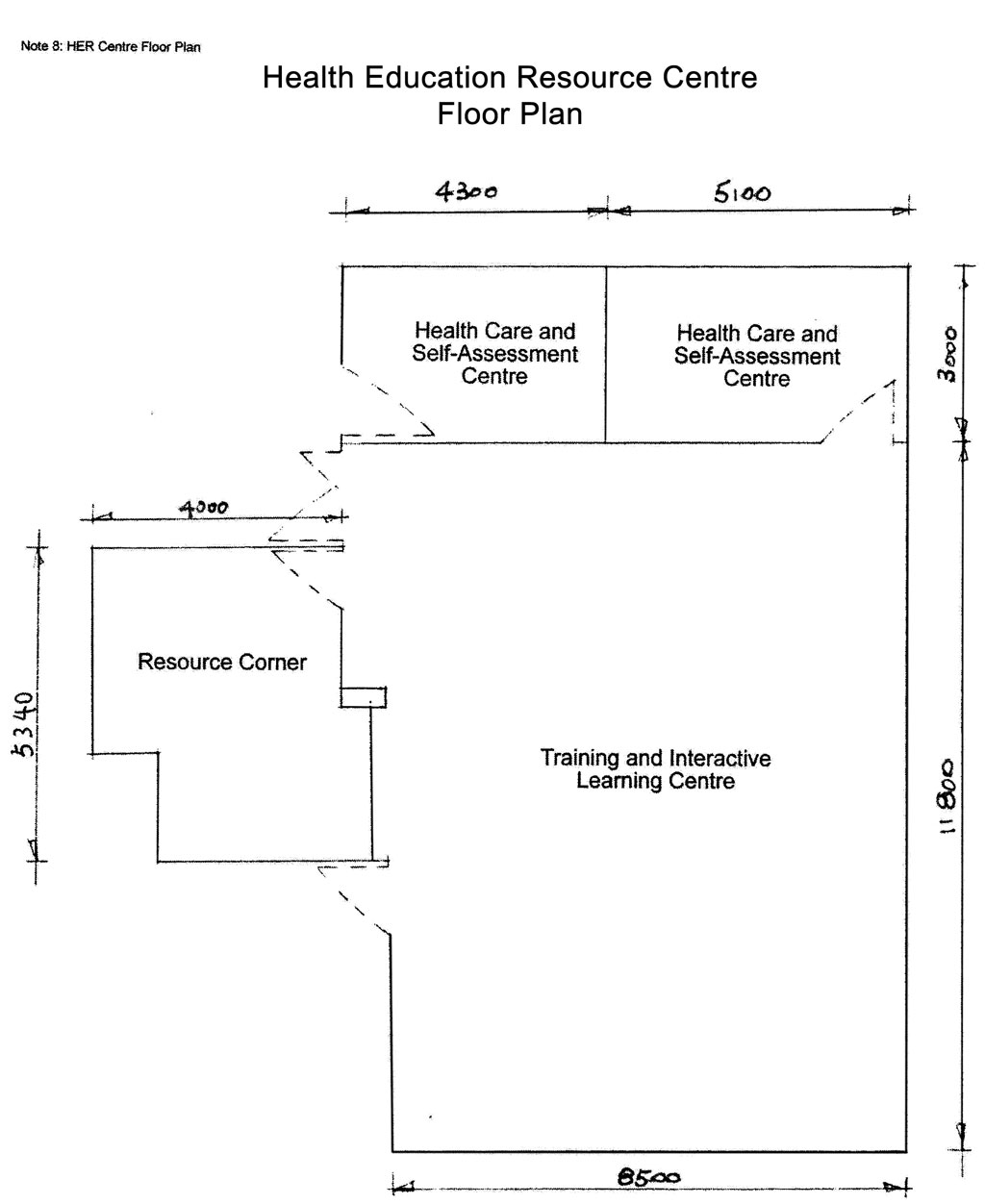
![]()
Q. Strengths of Lam Tai Fai College in promoting Health Management and Social Care:
- Ever since its foundation in 2004, Lam Tai Fai College has cherished the goals of promoting a healthy school culture in secondary school. Health Education is offered as a compulsory subject in our S1 to S7 curriculum, the first secondary school in Hong Kong.
- The school enjoys the patronage and guidance of a very supportive School Management Committee. Our distinguished School Management Committee consists of respectable academics and professionals who receive excellent reputation in their fields and in the society. Its members support and contribute to the school by applying their professionalism to different aspects of school affairs.
- Professor Albert Lee (Director, The Centre for Health Education and Health Promotion, Faculty of Medicine, The Chinese University of Hong Kong; Professor and Head, Family Medicine Unit, Department of Community and Family Medicine, Faculty of Medicine, The Chinese University of Hong Kong; Member of Curriculum Development Council and Chairman of Health Management & Social Care Committee, CDC – HKEAA, HKSAR ) as one of the our school managers. Professional guidance and leadership has been provided in the offering of Health Education as a subject and most important of all, in developing and implementing School Health Promoting School Programmes in LTFC. A genuine healthy school with health promoting cultures that include knowledge and concepts, values and beliefs, skills and actions being driven by curriculum oriented approach. It makes LTFC goes apart from the normal healthy schools by the inclusion of a wide range of health promoting activities and programmes.
- Since the school plays a pivotal role in Health Education, we have possessed a team of very professional teaching force in Health Education. With the advent of NSSC and the offering of a new subject, Health Management & Social Care, Professor Albert Lee, our School Manager, was interviewed by Mingpao (January 8, 2008) on LTFC as the Flagship for Health Education in the Territory & pioneering role in offering HMSC (New NSS subject).
The news reports ran:
It was reported that Lam Tai Fai College was the first school offering a pioneering course in Health Education at secondary level. Our School Manager, Professor Albert Lee, as a Member of Curriculum Development Council and Chairman of Health Management & Social Care Committee, CDC – HKEAA, HKSAR explained the strength of LTFC in the existing balanced, diversified and forward-looking curriculum framework. Professor Lee went further onto promoting healthy school culture through the healthy schools project launched by the Director, The Centre for Health Education and Health Promotion, Faculty of Medicine, The Chinese University of Hong Kong. It was emphasized a school-based Health Education helps foster students' whole-person development. It enhances students' capacity in meeting adversity and further stretching their potentials. Health Education thus forms an integral part of students' all-round development and character formation. When going up to senior secondary school, students can opt for Health Management & Social Care (HMSC). It also prepares students for future career in the field of medical and health care.
- At the same time, a truly school-based, student-centered, innovative and comprehensive Health Education curriculum was offered and will continue to offer in LTFC. As a school which had offered the subject ever since its establishment (in 2004), the school enjoys an extensive links with the community which is conducive to the building of a healthy community (2009-2010) and good links with the community. Very intimate partnership with the Centre for Health Education and Health Promotion (CHEP) has been forged. Actions in the following areas like building healthy public policy, create supportive environments, strengthen community action, develop personal skills and reorient health services are fully taken care of with very thorough planning at the level of the SMC, the School Development Steering Committee as well as with all the staff duly informed.
- The school has rich experience in running a school-based Health Education in the secondary school curriculum. We will continue to take the need in supporting our counterparts in the promotion of Health cultures in schools and in the delivery of the Education for Health curriculum and of course, the Health Management & Social Care (HSMS) in the Diploma Examination.
- Education for Health has been put as one of the domains in the school's whole-person development framework. A school-based Life-wide Integrative Extended Curriculum moves towards the realization of a Life-long and Life-wide Sustainable Learning Model.
- The school will continue to explore opportunities for students' career development and further studies in the related field of Health Education and Health Management & Social Care.
![]()
R. Expected deliverables of Lam Tai Fai College:
Expected tangible deliverables:
- School-based Product:
- Publication of teaching plans and curriculum guide of Education for Health Life-wide Extended Curriculum (as a blueprint for the planning of NSS OLE) and the senior secondary, Health Management & Social Care (HMSC)
- Publication of evaluation reports to inform on curriculum development and student all-round development services (whole-person development)
- Publication of resource materials for Education for Health Life-wide Extended Curriculum and HMSC (to give highlights for the innovative Life-wide & Integrative Education for Health curriculum in schools
- A learning carnival
- Student-based Product:
- Students' portfolio/profile on personal growth and health.
Expected Intangible Deliverables
- School-based Product:
- Effective curriculum studies with the promotion of health culture among members of the school community.
- Development of team spirit among the participants.
- A closer linkage with the parents, Healthy schools in the territory and partner schools in Mainland China as well as overseas through experience-sharing sessions, courses, seminars, workshops, mentoring programme, camps and visits.
- Student-based Product:
- The mastery of skills on self-learning, presentation and report writing.
- Health checking skills and health awareness.
- An understanding of the environmental, health & social problems
- An understanding of the self-identity and personal development.
- The acquisition of managerial skills, team spirit and social skills.
- The development of positive personality and character traits like patience, confidence self-esteem, love for one's country and nationhood.
Dissemination of deliverables/outcomes
- Pilot study or project in the Health Education Resource Centre
- Practice and hands-on training in the Health education Resource Centre
- Experience sharing sessions
- Collaborative lesson preparation and planning with schools
- Sharing of teaching plan and curriculum guide
- Sharing of teaching resource materials
Commercialization potential of deliverables/outcome
- Free experience sharing sessions, sharing of resource materials, collaborative lesson planning would be provided.
- Video-conferencing with students and academics in the territory and overseas.

